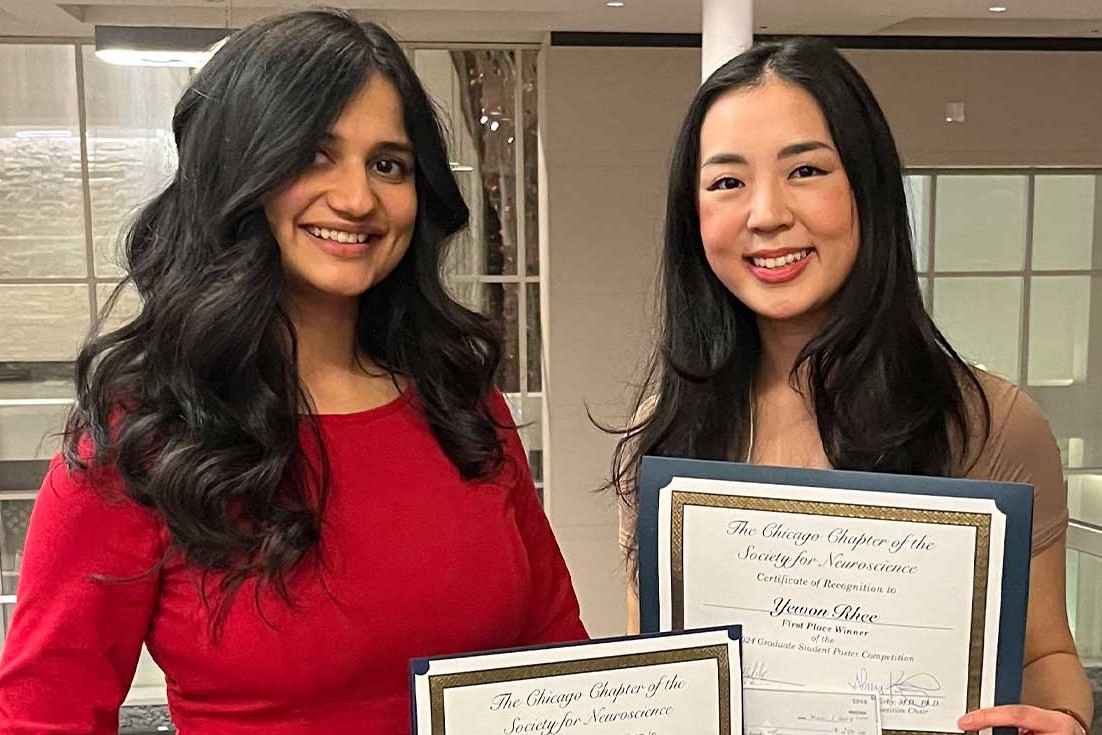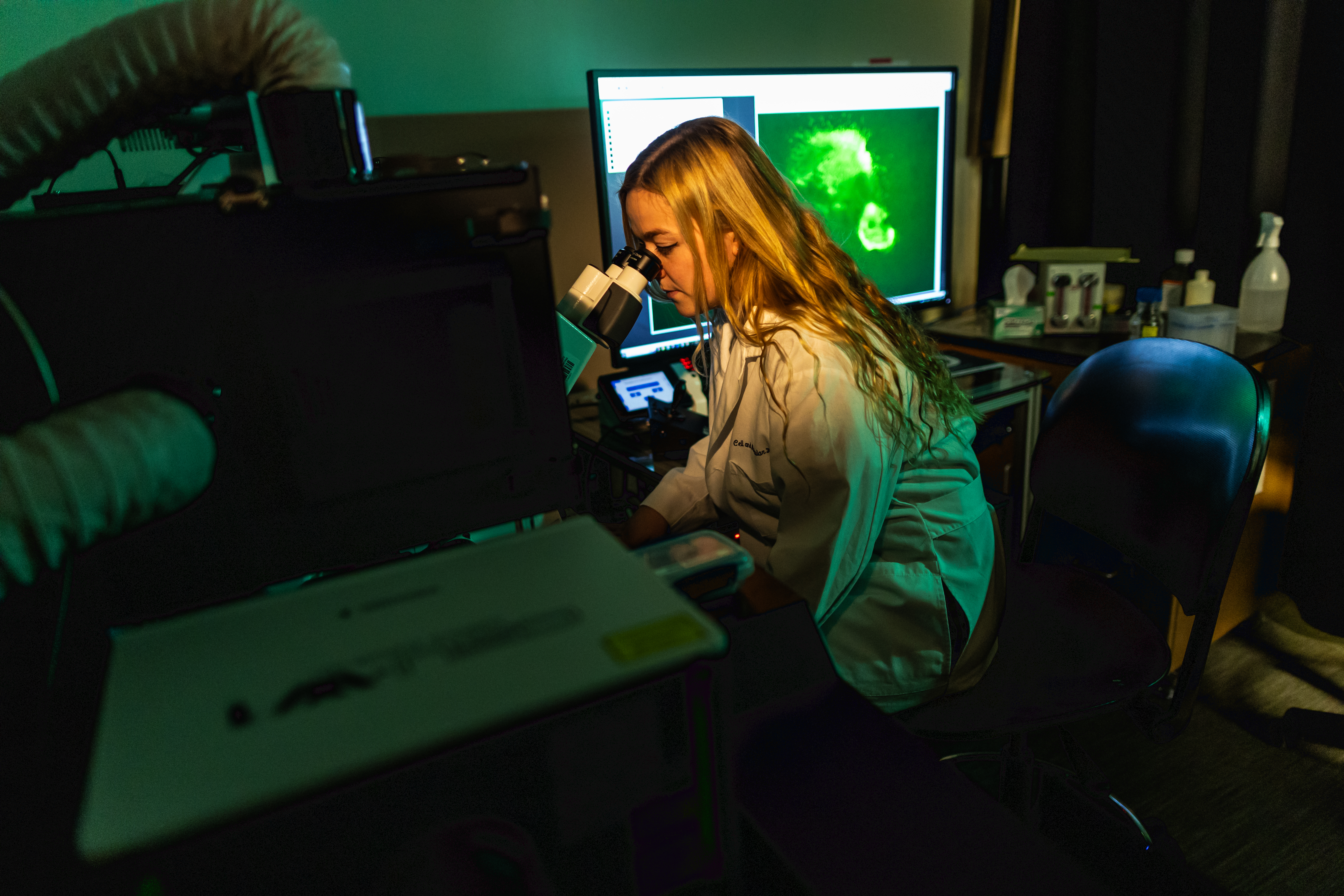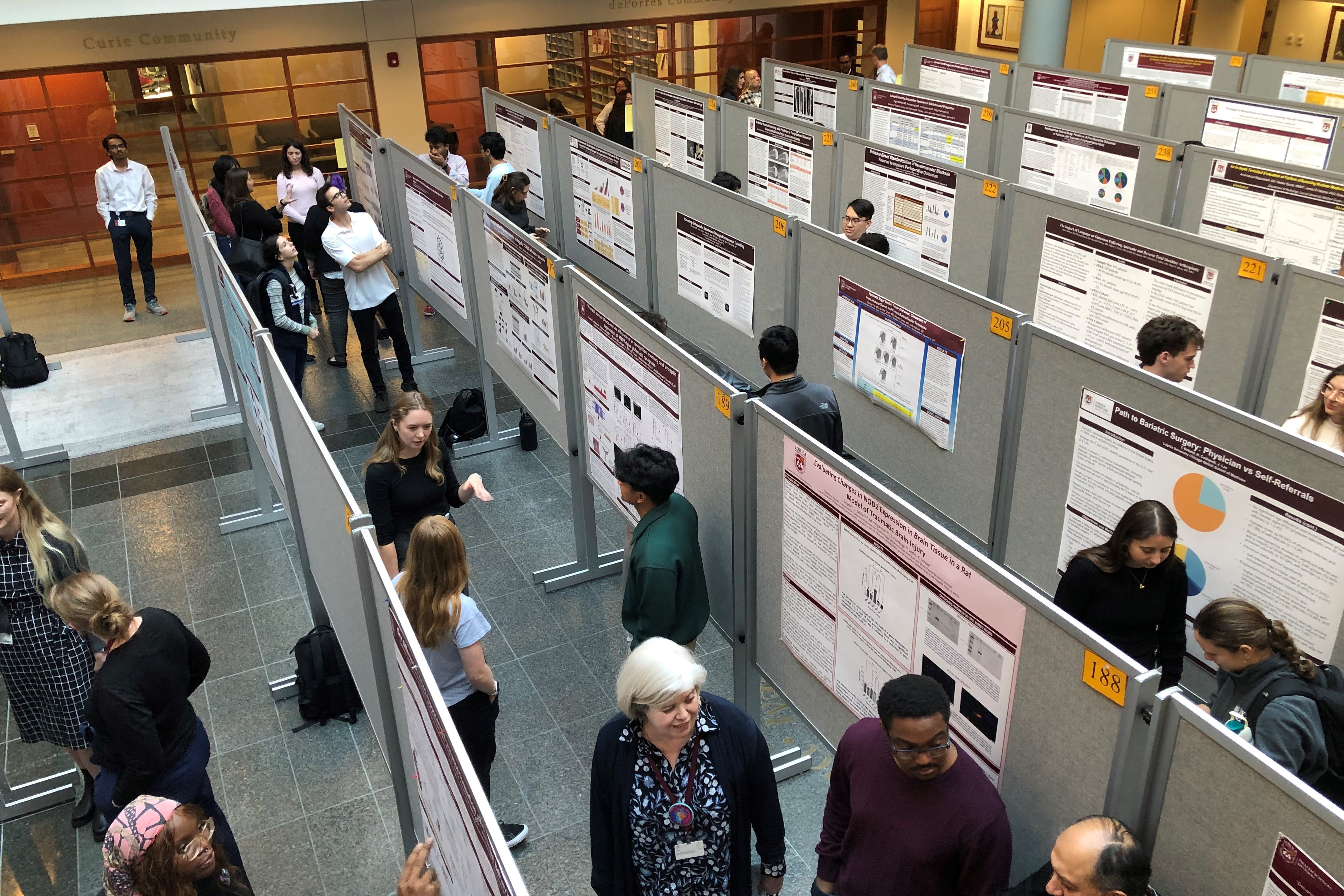
Masters in Neuroscience
Developing outstanding neuroscientists committed to scientific excellence and integrity
The Master of Science (MS) in Neuroscience is a two-year, research-intensive program designed to provide a foundational understanding of the biomedical sciences and an appreciation for emerging concepts and methodologies in neuroscience. Our master's degree program provides an interdepartmental and interdisciplinary approach to training in neuroscience that allows students to choose from a variety of research mentors and projects. During their training, our students develop the knowledge and confidence to utilize cutting edge techniques to address novel neuroscience questions and the communication skills necessary to succeed in challenging academic and industry environments.
Our graduates have gained admission to medical school (both allopathic or osteopathic), as well as PhD programs at Loyola and other top schools in the Chicago area and beyond. Many graduates have also obtained advanced technical research positions as well as sales and marketing jobs in the pharmaceutical industry.
Study With One of the Nation's Top Neuroscience Masters Programs
Loyola's two-year neuroscience master's degree is consistently ranked as one of the top neuroscience master's degrees in Chicago. This research-focused Neuroscience MS program was also recently recognized as one of the nations top graduate programs by Best Value Schools, ranking #9 of the "Best 15 Masters in Neuroscience Programs 2024". Whether you're looking to deepen your understanding of neural systems, pursue a career in research, or prepare for further studies, our program provides the resources and expertise to help you succeed.
Our Commitment To You
Graduates of Loyola's MS in Neuroscience will gain the following knowledge, skills, and professional values to pursue a career as a research scientist in academia or industry or pursue additional education.
KNOWLEDGE
- Foundational understanding of the biochemical and molecular basis of cell function and neuronal and glial cell function
- Broad, comprehensive understanding of the neuroscience fields including: neuroanatomy, neurochemistry, molecular neurobiology, neuropharmacology, neurophysiology, and behavior
- Expertise in several scientific techniques to study of the function of the central and/or peripheral nervous system
SKILLS
- Design and conduct experiments independently
- Analyze data
- Evaluate and apply scientific literature to experimental research
- Ability to present scientific work in a compelling manner
- Develop methodologies to explore the cellular and molecular basis of neuronal function in health and disease
PROFESSIONAL VALUES
- Ethical standards of behavior in science
Curriculum
Students must complete a minimum of 30 credits during this two-year MS program. The Neuroscience curriculum helps students develop the skills to explore the cellular and molecular basis of neuronal function in health and disease. In addition to regular coursework, students must participate in a student-centered weekly journal club and weekly neuroscience seminars and student progress reports. Both are intended to facilitate students’ abilities to critically read, question, and synthesize scientific knowledge and to hone their presentation skills.
YEAR 1 - Fall
Students complete two, six-week research rotations in addition to the following courses:
- BMSC 410 - Biochemistry & Molecular Biology (4 credits)
- BMSC 412 - Cell Biology (4 credits)
- BMSC 416 - Methods in Biomedical Science (1 credit)
- BMSC 405 - Ethics in Biomedical Sciences (1 credit)
- NRSC 503 - Neuroscience Journal Club (1 credit)
YEAR 1 - Spring
- BMSC 402 - Statistical Methods in Biomedical Sciences (3 credits)
- NRSC 410 - Cell and Molecular Neurobiology (3 credits)
- NRSC 503 - Neuroscience Seminar (0 credits)
- NRSC 499 - Research (2 credits)
- BMSC 418 - Presentation Skills (1 credit)
YEAR 2- Fall
- NRSC 415 - Neurochemistry (3 credits)
- NRSC 503 - Neuroscience Journal Club (1 credit)
- NRSC 499 - Research (4 credits)
YEAR 2 - Spring
- NRSC 503 - Neuroscience Seminar (0 credits)
- NRSC 499 - Research (2 credits)
- NRSC 595 - Thesis Supervision (0 credits)
Course Catalog
Admission
Ready to apply? This is a good place to start.
APPLICATION DEADLINES
We accept applications on a rolling basis. We encourage students to apply by April 15 to ensure their application receives a full review. The deadline for all application materials is June 15. Typically, orientation is two days in late July, followed by an early August start date.
APPLICATION PROCESS (There is no application fee.)
1. COMPLETED APPLICATION
- We strongly urge you to apply online. You may mail your application (although that will delay our receipt) to:
Graduate and Professional Enrollment Management
Loyola University Chicago
820 N. Michigan Avenue, Suite 1200
Chicago, IL 60611
2. OFFICIAL TRANSCRIPTS
- Applicants should have earned a bachelor's degree (at minimum) to apply. Transcripts for all undergraduate and graduate work are required for admission.
- The MS in Neuroscience program requires applicants to have taken two semesters or the equivalent in each of the following: Biology, Chemistry, and Organic Chemistry. Students also should have completed the accompanying laboratory courses within each discipline.
3. LETTERS OF RECOMMENDATION
- Applicants must submit three letters of recommendation. We encourage applicants to have letters of recommendation submitted by individuals who have supervised the student either in an academic course or research environment, and who have direct knowledge of the student's aptitude for scientific research.
4. STATEMENT OF PURPOSE
- Your statement of purpose should be a brief, one page statement that explains your interest in this program.
5. INTERVIEW
- A virtual interview is required for admission. International applicants can interview via phone or video conference.
Please note: the only documents that cannot be uploaded with an application are transcripts and official test scores. Please send those documents directly to: gradapp@luc.edu.
FOR INTERNATIONAL APPLICANTS
International applicants must have a degree equivalent to a U.S. Bachelor's degree and are required to submit the above documents and:
- TOEFL or IELTS scores
- A Declaration and Certification of Finances Form
- Evaluations of international transcripts by any member organization of NACES (National Association of Credential Evaluation Services)
Please visit our International Student Requirements page for more details!
Please note: the only documents that cannot be uploaded with an application are transcripts, official test scores, and transcript evaluations. Please send those documents directly to: gradapp@luc.edu
For more information, contact Student Program Recruiter Patrick Hulseman.
FAQs
WHERE ARE THESE PROGRAMS LOCATED?
The Biomedical Sciences programs are located at Loyola University Chicago's Health Sciences Campus in Maywood, approximately 12 miles west of downtown Chicago. The campus is home to the Stritch School of Medicine, Marcella Niehoff School of Nursing, the Parkinson School of Health Sciences and Public Health, the Cardinal Bernardin Cancer Center, and Loyola Medicine, our academic medical center partner. The campus features state-of-the-art facilities for education and biomedical research.
HOW MANY STUDENTS ARE ENROLLED IN THE BIOMEDICAL SCIENCES PROGRAMS?
Approximately 175 graduate students are enrolled in Loyola's Biomedical Science programs.
WHAT IS THE TYPICAL COURSEWORK?
MS students enroll in a Core Curriculum during their first and second semesters, followed by advanced coursework and research training in their area of specialization. After completing lab rotations, students select an advisor who will mentor them throughout their studies and in many cases, after graduation.
Tuition and Financial Aid
Loyola's Graduate School and its Financial Aid Office are committed to helping students secure the financial resources to make their education at Loyola affordable.
Faculty
JOANNA C. BAKOWSKA, PhD
Associate Professor, Molecular Pharmacology and Neuroscience
PhD- Molecular and Behavioral Neuroscience, Rutgers
Research Interests: Genetic, behavioral, and cellular mechanisms that underlie spastic paraplegias.
ED CAMPBELL, PhD
Professor, Microbiology and Immunology
PhD- Microbiology and Immunology, University of Illinois at Chicago
Research Interests: Understanding the mechanisms of cellular invasion by amyloid protein aggregates associated with neurodegenerative disease and the cellular dysfunction induced by such invasion.
EILEEN FOECKING, PhD
Associate Professor, Otolaryngology - Head and Neck Surgery and Molecular Pharmacology and Neuroscience
PhD- Neurobiology and Physiology, Northwestern University
Research Interests: Mechanisms of peripheral nerve injury and repair with focus on therapeutic and surgical techniques to enhance regeneration.
ROCCO GOGLIOTTI, PhD
Assistant Professor, Molecular Pharmacology and Neuroscience
PhD- Biomedical Research, Northwestern University
Research Interests: Neurogenetics of autism and autism-associated disorders and the neuropharmacology of novel treatment strategies.
CELESTE GREER, PhD
Assistant Professor, Molecular Pharmacology and Neuroscience
PhD- Pharmacology, Yale University
Research Interests: Transcriptional mechanisms that influence learning and memory
SIMON KAJA, PhD
Associate Professor, Dr. John P. and Therese E. Mulcahy Endowed Professor in Ophthalmology
PhD- Leiden University, Ophthalmology and Molecular Pharmacology & Neuroscience
Research Interests: Identification of pathophysiological mechanisms underlying human ophthalmic, neurological and neurodegenerative disorders.
KELLEY LANGERT, PhD
Assistant Professor, Molecular Pharmacology and Neuroscience
PhD- Neuroscience, Loyola University Chicago
Research Interests: Targeted drug delivery to the inflamed peripheral nerve, identifying novel therapeutic targets at the blood-nerve barrier and the leukocyte-endothelial interface, elucidating the physiological and pathophysiological roles of monomeric GTPases in endothelial cells.
TONI PAK, PhD
James R. DePauw Professor and Chair, Department of Cell and Molecular Physiology
PhD- Neuroscience, University of Colorado (Boulder)
Research Interests: Neuroendocrine regulation of puberty; molecular mechanisms of nuclear steroid receptor function.
ERIKA PIEDRAS-RENTERIA, PhD
Associate Professor, Cell and Molecular Physiology
PhD- Physiology, University of Illinois Urbana-Champaign
Research Interests: Molecular mechanisms of neuronal P/Q calcium channel function in normal and diseased states, including spinocerebellar ataxia type 6 (SCA6).
KARIE SCROGIN, PhD
Professor, Molecular Pharmacology and Neuroscience
PhD- Behavioral Neuroscience, Oregon Health Sciences University
Research Interests: Anxiety, mood disorders and neural control of circulation in heart disease.
MEHARVAN SINGH, PhD
Vice Provost of Research and Professor of Cellular and Molecular Physiology
PhD- Pharmaceutical Sciences, University of Florida
Research Interests: Role of gonodal hormones in aging brain and age-assocaiated neurodgenerative diseases
MONSHEEL SODHI, PhD
Assistant Professor, Molecular Pharmacology and Neuroscience
PhD- Biochemistry, Kings of College London, U.K.
Research Interests: Post-transcriptional regulation of gene expression (RNA editing, alternative splicing, microRNAs) in mood disorders, psychosis and after exposure to stress.
EVAN B. STUBBS, JR. PhD
Professor, Ophthalmology
PhD- Biochemistry, University of Missouri
Research Interests: Cellular and Molecular Mechanisms of Metabolic and Acquired Neuropathies, including diabetic neuropathy, glaucomatous neuropathy, and acquired inflammatory demyelinating neuropathies such as Guillain-Barré Syndrome.
GONZALO TORRES, PhD
Professor of Molecular Pharmacology and Neuroscience
PhD - Pharmacology and Physiology, Saint Louis University
Research Interest: Function and regulation of brain monoamine transporters in the context of psychostimulants and antidepressants actions
ERIC VILLALON LANDEROS, PhD
Assistant Professor of Molecular Pharmacology and Neuroscience
PhD - University of Missouri, Neuroscience
Research interests: Cell and molecular basis of Neuronal Membrane Proteasome(NMP)-dependent signaling modulation of pain and itch sensation.
DEREK WAINRIGHT, PhD
Associate Professor, Cancer Biology
MS, PhD – Cell Biology Neurobiology, and Anatomy, Loyola University Chicago
Research Interests: Neuroimmunology and glioblastoma therapy
News & Events

Graduate Students Win Society for Neuroscience Competitions
Loyola Graduate Students have strong showing at Society for Neuroscience Conference winning presentation and poster competitions.

Super Resolution Microscope
Super Resolution Microscope acquired by Health Sciences Campus is a game changer for our Graduate Biomedical Sciences Programs.

St. Albert's Day 2024
Salutes student research in the Graduate School, Stritch School of Medicine, Marcella Niehoff School of Nursing and Parkinson School of Public Health.
The Master of Science (MS) in Neuroscience is a two-year, research-intensive program designed to provide a foundational understanding of the biomedical sciences and an appreciation for emerging concepts and methodologies in neuroscience. Our master's degree program provides an interdepartmental and interdisciplinary approach to training in neuroscience that allows students to choose from a variety of research mentors and projects. During their training, our students develop the knowledge and confidence to utilize cutting edge techniques to address novel neuroscience questions and the communication skills necessary to succeed in challenging academic and industry environments.
Our graduates have gained admission to medical school (both allopathic or osteopathic), as well as PhD programs at Loyola and other top schools in the Chicago area and beyond. Many graduates have also obtained advanced technical research positions as well as sales and marketing jobs in the pharmaceutical industry.
Study With One of the Nation's Top Neuroscience Masters Programs
Loyola's two-year neuroscience master's degree is consistently ranked as one of the top neuroscience master's degrees in Chicago. This research-focused Neuroscience MS program was also recently recognized as one of the nations top graduate programs by Best Value Schools, ranking #9 of the "Best 15 Masters in Neuroscience Programs 2024". Whether you're looking to deepen your understanding of neural systems, pursue a career in research, or prepare for further studies, our program provides the resources and expertise to help you succeed.
